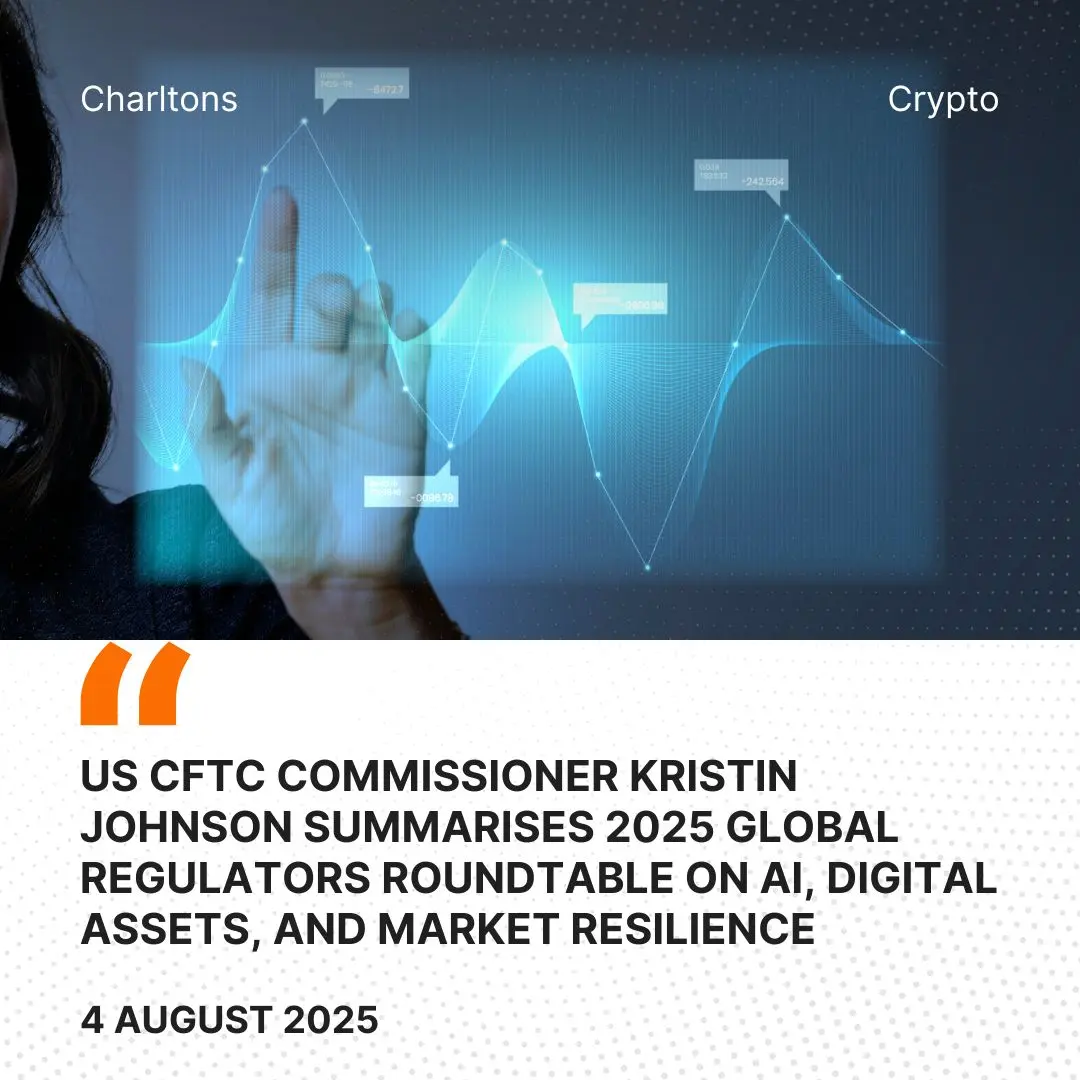
On 05 August 2025, United States Commodity Futures Trading Commission (US CFTC) Commissioner Kristin N. Johnson issued a formal statement summarising the outcomes of the 2025 Regulators Roundtable on Financial Markets Innovation and Supervision of Emergent Technology, held on 14 July 2025 in London, United Kingdom. Convened by Commissioner Johnson, the high-level event brought together market regulators, central banks, and consumer protection authorities from the United States, the United Kingdom, and Europe. A follow-on Public–Private Roundtable on Surveillance and Supervision in the Age of AI and Digital Assets, moderated by Bénédicte Nolens of the BIS Innovation Hub (Hong Kong), further expanded on the supervisory and operational implications of technological innovation.
Commissioner Johnson’s statement outlines the central themes and takeaways from the roundtables and related industry events, including key discussions on artificial intelligence (AI), operational resilience, third-party risk, digital assets, surveillance systems, and supervisory governance. The statement consolidates insights from domestic and international regulatory developments, including ongoing CFTC rule proposals and the Market Risk Advisory Committee’s (MRAC) recommendations on clearinghouse oversight.
Highlights from the 2025 Regulators Roundtable
- Artificial Intelligence and Supervisory Oversight: Regulators examined the growing use of AI in trading, surveillance, and compliance functions, with particular attention to risks involving third-party AI vendors, explainability, bias, and model governance. Commissioner Johnson underscored the need for fit-for-purpose frameworks and international regulatory alignment, citing the CPMI-IOSCO Principles for Financial Market Infrastructures (PFMIs). Participants encouraged post-deployment monitoring and scenario-based testing for AI systems.
- Cybersecurity and Operational Resilience: Recent cyber incidents—including the 2023 ION Derivatives ransomware attack, the 2024 CrowdStrike failure, and the 2025 Bybit infrastructure breach—were discussed as examples of systemic technology risks. Participants supported stronger frameworks for real-time incident response, firm-level accountability, and business continuity planning.
- CFTC Operational Resilience Framework Proposal: Commissioner Johnson updated attendees on the US CFTC’s December 2023 proposal requiring futures commission merchants, swap dealers, and major swap participants to adopt formal operational resilience frameworks. The rule would mandate comprehensive security programmes, third-party oversight mechanisms, and robust disaster recovery plans. The MRAC’s CCP Risk & Governance Subcommittee has also recommended enhancing CFTC Rule 39.18 to require lifecycle vendor oversight by derivatives clearing organisations (DCOs), including compliance with the PFMIs.
- Third-Party Risk and Infrastructure Concentration: Discussions highlighted increasing dependencies on cloud, AI, and cybersecurity vendors. Regulators warned that concentrated reliance on a small number of service providers could introduce systemic risks. Participants shared updates on the EU’s Digital Operational Resilience Act (DORA), aimed at supervising critical third-party ICT service providers by the end of 2025.
- Digital Assets and Stablecoins: Participants examined stablecoins in cross-border payments, particularly in emerging markets, and discussed tokenisation and distributed ledger technology (DLT) in modernising market infrastructure. While stablecoins may enhance efficiency and inclusion, concerns remain about legal certainty, settlement risks, and monetary policy spillovers. Regulators stressed the importance of global coordination in regulating digital assets.
- Incident Response and Information Sharing: Operational resilience requires routine testing and cross-jurisdictional collaboration. Participants recommended developing standardised information-sharing protocols and threat intelligence playbooks, with an emphasis on real-time coordination between regulators and technology providers.
Summary from the Public–Private Roundtable on Surveillance and Supervision
The follow-up event explored how AI and digital assets are redefining surveillance models. Discussions focused on:
- AI’s Role in Combating Financial Crime: Use of behavioural detection tools, LLMs, and multilingual surveillance to detect spoofing, wash trading, and sanctions evasion. Attendees acknowledged the escalation from manually executed crypto crimes to AI-enabled fraud and laundering using synthetic identities.
- Surveillance Gaps in Crypto Markets: Many trades occur off-chain within centralised exchanges, limiting transparency. Participants discussed smart contract exploits, AI-generated pump-and-dump schemes, and a $700 million Japan-based market manipulation case involving account takeovers and asset inflation.
- Explainable AI and Compliance: While LLMs offer promise for cross-border surveillance, participants stressed the necessity of human-in-the-loop systems and governance frameworks to ensure AI-generated alerts are trustworthy and actionable.
- Data Fragmentation and Regulatory Capacity: Regulatory frameworks must be modernised to accommodate AI-based compliance tools. Participants called for co-designed oversight models and public-sector data hubs to improve market visibility.
- Delegation Risks and Regulatory Readiness: The need to strengthen public supervision and avoid unchecked reliance on proprietary surveillance technologies was emphasised. Enhancing regulatory expertise and inter-agency coordination were cited as urgent priorities.
The Role of Collaboration
Commissioner Johnson highlighted that both public-private and cross-border collaboration remain essential for supervisory agility in the face of rapidly evolving technologies. Co-designed frameworks and harmonised expectations can bolster innovation while preserving market integrity. She reiterated that periodic global convenings such as the Regulators Roundtable play a critical role in identifying emerging risks, aligning policy responses, and ensuring that regulatory approaches evolve in tandem with market realities.
(Source: https://www.cftc.gov/PressRoom/SpeechesTestimony/johnsonstatement080525)





